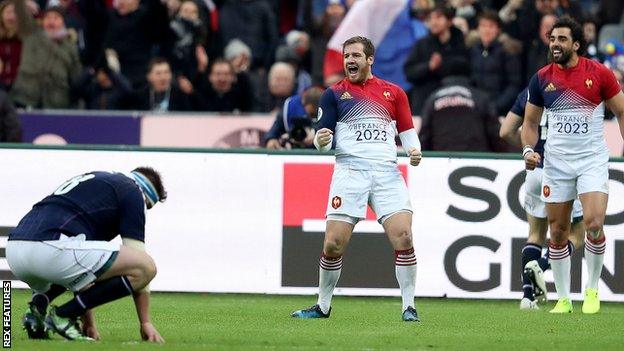Resilient Scotland so close despite battering by French scrum
- Published

France were the ones celebrating in Paris
It wasn't so much the front page headline that adorned Monday morning's L'Equipe that told the story of the Test, although 'soulages', or relief, was a pretty apt description of the feelings in the French camp.
No, it was another headline inside that summed it up - a love song to the brutality of the home pack. Below a picture of their heavy brigade demolishing another Scottish scrum, "Merci les gros!" captured the mood fairly well. "Les Bleus ont su abandonner leur projet de jeu ambitieux pour revenir aux basiques et enforcer...".
You didn't need to speak the lingo to get the message. France had ditched their notions of expansive rugby and replaced it with biff, grunt and as much physicality as they could muster, which was plenty. The enforcers won.
Having lost so many games for so many years, France had reached desperation point. They had to beat the Scots. And the best way they knew how was to bully the life out of them.
What was instructive was the Scottish mindset afterwards. It was one of disappointment to the point of dejection and devastation, not just among the players but the fans too.
We should think about this. Scotland were missing their first-choice props. They then lost their captain, their vice-captain and their vice-captain's replacement very early in the game. All the while, their scrum got obliterated.

L'Equipe expressed the French nation's relief on Monday morning
In past years, had any or all of these things befallen Scotland then everybody would have been watching from behind the couch. The belief in this team's capacity to win has rocketed though.
Despite massive odds, they were close to pulling it off. As they sought to come back at the death, their decision-making became ragged and their composure was lost, but they were still alive. They had no right to be given what had happened to them, but they were.
Scotland were hanging in there because, a slapstick Finn Russell conversion apart, they made their few chances in the game go a very long way. Their second try wasn't even a chance - it was a bit of opportunism that is becoming the hallmark of this team, part of the reason why they are so exciting to watch.
They are so quick to recognise an opening now and so efficient at executing.
When Tommy Seymour galloped up the right wing, got the better of Scott Spedding and then found Tim Swinson running the most fantastic support line, it was a try that dropped out of the Parisian sky. And it put Scotland ahead.
It was a trippy moment. At that point, Scotland had no business being ahead. The French must have wondered what on earth was going on out there.
Scotland had lost Greig Laidlaw, John Barclay and John Hardie to injury by then. They had already conceded three scrum penalties and one scrum free-kick. They had precious little ball to play with.

Scotland captain Greig Laidlaw (right) left Paris on crutches
Not enough possession, not enough territory and yet they had the lead. In previous years, they'd have been 15 points behind in those circumstances.
That conversion was a calamity. Sure, Scotland lost by six points, so on the face of it, it didn't matter. But psychologically surely it did, for France as much as Scotland.
Not long afterwards. Russell put a restart out on the full. We can't ever know for sure if the miss was still in his head - he will say no - but it was untypical of him.
France had been given a two-point let-off and things like that galvanise a team. Scotland were in the business of stripping away France's self-belief and getting their crowd whistling their derision - and the Swinson try against the odds was getting the job done nicely.
Can you imagine the discussion behind the French posts? "We're killing these guys in the scrum, so why are we losing? What is happening here?" Then the miss and the boost it would have given the hosts. It wasn't the difference between victory and defeat, but it was a small part of why it happened.
Another, far chunkier part, was the scrum. Six scrum penalties and one scrum free-kick were conceded on Sunday on top of further scrum problems against Ireland the week before.
Referees are watching for this now. Scotland have a bad reputation.
If a scrum hits the deck against Wales, who do you think will be penalised more often than not? A Welsh scrum that's been operating well, or a Scottish scrum that's been going backwards and down? These things matter.
Vern Cotter has had to deal with huge upset in this area. Since the World Cup in 2015 and through to the Six Nations in 2016, Alasdair Dickinson and WP Nel were the coach's first-choice props - and they were formidable. Not only had they brought stability back to the scrum, but they had big engines too. They were the rocks upon which Cotter was rebuilding Scotland.
They're both out through injury. So is Edinburgh's Rory Sutherland, who came off the bench in Scotland's final game of last year's Six Nations in Dublin.
Of the others - Ryan Grant went to the World Cup, but his career has stagnated badly and he's now trying to rediscover himself with Worcester, Jon Welsh also went to the World Cup but he's out of favour despite being a regular with Newcastle and Moray Low is out of the picture as well, as something of a bit-part player with Exeter.
Scotland cannot afford to have three of their frontline props all injured at the same time. Their brilliance in attack will mean that they will have a chance in most games, but it's hard to plug those holes when it's the likes of the French coming at you with only one thing in mind - physical dominance, death by scrummaging.
The fact that Scotland came within six points was a tribute to their finishing ability and the size of their heart. They will be a match for everybody in this Six Nations.
The suspicion, and frustration, is that, if they could only pick from a full deck, they could well be contenders.
- Published12 February 2017

- Published13 February 2017

- Published13 February 2017
